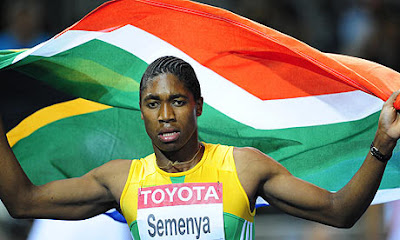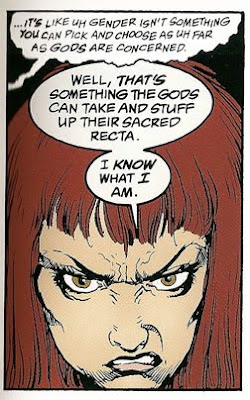
One of the interesting things about the Caster Semenya kerfuffle is how it brings out the inadequacies of essentialist thinking. Sporting discrimination between male and female is predicated on their being an ineradicable difference between the two genders. Contestants have to be placed in one of two boxes ‘male’ and ‘female’. What happens if someone doesn’t qualify under either heading (I have no idea if this lady doesn’t; it just raises the issue)? It brings the classification system itself into question.
This thinking is a key part of what underlies the teaching in Leviticus 18 & 20 that it is an “abomination” for a man to lie with a man. The understanding is (and I’m drawing on Gareth Moore here) that there is a right way for sexual relations to be ordered, and it involves the two parties being members of particular and opposite categories (with male superior to female of course); the boundaries must not be transgressed. Human beings have to fit into the different categories (‘male and female he created them’) and, again, if there are people who don’t fit, it brings the classification system itself into question. Which is why there is the language about ‘the authority of Scripture’ – even if we leave aside questions of consistency, this issue does threaten that authority.
Two of my favourite graphic novel series deal with issues of transvestitism/transsexuality (forgive me if I don’t use the terminology properly), in differing ways. In the Sandman sequence there is a pre-op male to female transsexual called Wanda, who lives as a woman but who, at a key moment in the plot is rejected as a woman (by the Moon) because she has a Y chromosome: she is not acceptable as a female on essentialist grounds. In contrast to this, in The Invisibles, one of the key characters is Lord Fanny, who was born a boy but raised as a girl, and who, in a climactic engagement with the God Mictlantecuhtli is accepted as a witch because she made the God laugh.
What I want to ask is: where are Christians called to stand? Are we with the moon in saying that there is something essential that needs to be safeguarded and preserved – the boundaries are absolute? Or are we with Mictlantecuhtli and prepared to be flexible, allowing our categories to be bent?
For me the answer is pretty clear. We are called to recognise and relate to all people as individuals, not as members of one class or another. In particular, there is such an absence of genuine love in so many places in our world that it seems bizarre not to celebrate love when it can be found.
I see this as a development rooted in Christian understandings – not so much in Scripture as the unfolding of a tradition from that Scripture, specifically the teaching that in Christ there is no male or female etc – in other words, in Christ all the old essentials have been dissolved. Our identity now rests in our relationship with Him and all the other categories can get lost.
In other words:
UPDATE: an interesting article, via AKMA.

